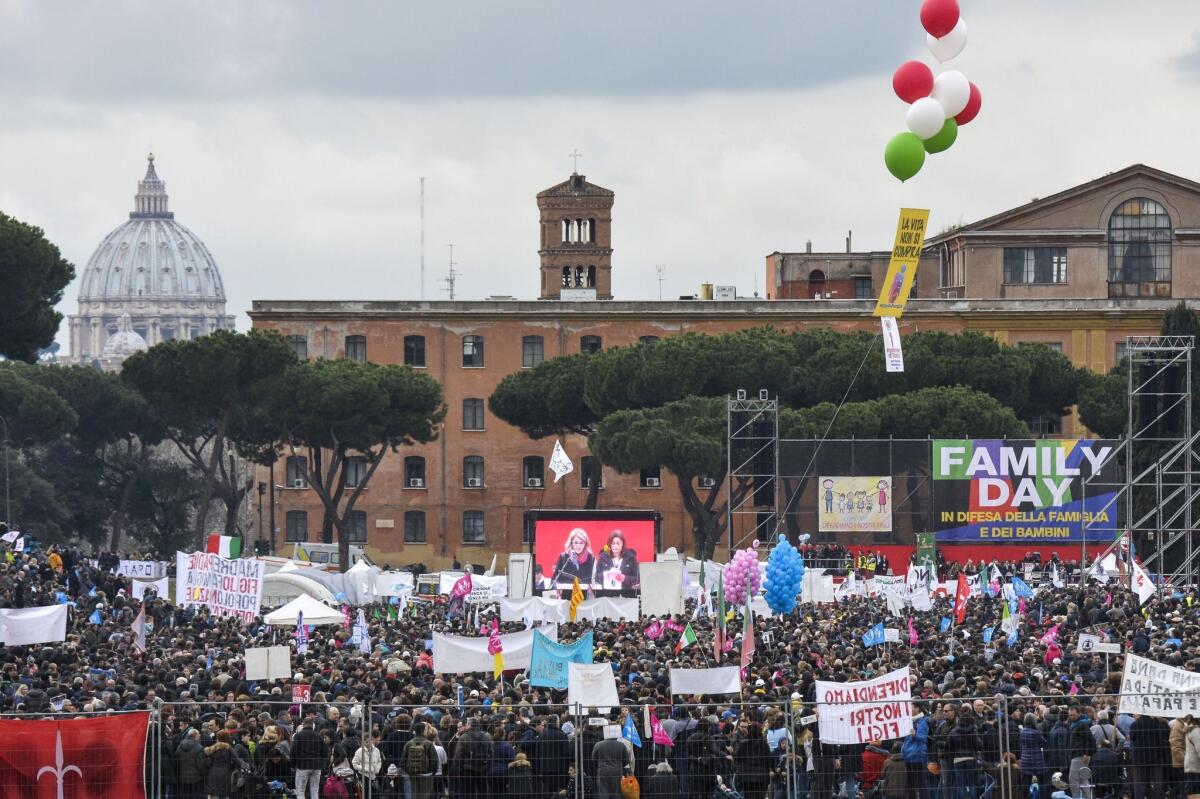Thousands rally against legalizing same-sex civil unions in Italy

Thousands of people took part in a rally at Rome’s ancient Circus Maximus to voice opposition to proposals to legally recognize same-sex civil unions.
Thousands of people filled Rome’s Circus Maximus on Saturday to protest a proposal to legally recognize same-sex civil unions in Italy, the only county in Western Europe not to do so.
Around 1,500 buses were chartered from across Italy to bring the protesters, who filled the ancient Roman chariot racing arena. Parents pushed strollers, Roman Catholic priests were out in force, and people waved balloons and banners, including one that read, “No to the Gaystapo,” a reference to the Nazi Gestapo.
Organizers claimed 2 million people attended the “Family Day” rally, although the site is known to hold far fewer than a million.
The figures are important. Italian politicians pay close attention to such events and have been known to change their positions on legislation, depending on how many people show up.
Supporters of the bill also have been making themselves heard, staging a series of demonstrations across Italy last weekend.
Prime Minister Matteo Renzi’s government opted to delay the start of voting on the proposed legal changes in the Italian Senate — originally planned for Thursday — until after Saturday’s rally, and politicians are likely to argue for days about the true turnout.
Renzi has made legalizing same-sex civil unions a centerpiece of his legislative program, spurred in part by pressure from the European Court of Human Rights.
But the bill has divided the premier’s supporters. His interior minister, Angelino Alfano, received the organizer of Saturday’s rally, Massimo Gandolfini, at his office before the event and tweeted, “Full support for the objectives of the demonstration.”
Speakers at the Circus Maximus were cheered as they lambasted the government’s proposals.
“A baby should have a mother and a father,” said Lavinia Mennuni, president of Mothers of Italy, a group promoting childbirth in the country. “With this law, children have no rights, they are the object of the rights of others.”
Others in the crowd said they were prepared to see same-sex couples receive some rights, but objected to a hotly debated clause that would permit them to legally adopt the biological children of their partners.
“Rights for gay couples are fine, if we are talking about someone inheriting the pension of a partner if they die, but having a child is not a right,” said Giuseppe Motti, a lawyer.
On stage, Gandolfini said he was not prepared to split hairs, demanding that the whole bill be withdrawn.
“We are not talking about fixing something small, or changing three or four words,” he said. “The bill must be totally rejected.”
The resistance to the bill reflects Italy’s strong Catholic identity. However, Pope Francis has left Italians guessing as to whether he supports the opposition.
Since his election in 2013, the Argentine pontiff has appeared to disapprove of the habit of Italian bishops of getting involved in local politics.
Cardinal Angelo Bagnasco, the head of the Italian Bishops Conference, openly backed Saturday’s rally. However, Bishop Nunzio Galantino, who was appointed by Francis as the conference’s secretary-general, has been more cautious.
In an interview this month with the Italian daily Corriere della Sera, Galantino reiterated church teaching that marriage is between a man and a woman, but he appeared to suggest that governments could recognize “different types of union.” Asked if a bishop could take part in the “Family Day” rally, Galantino replied, “He can, but he cannot claim that all the other bishops will take part.”
Father Jules Mimeault, a Canadian theologian who was among dozens of priests and monks mingling with the crowd at the Circus Maximus, said, “Bagnasco and Galantino have indicated two approaches to the rally.”
“I agree with Bagnasco — we all have a right to be here, including priests,” Mimeault said.
Political horse-trading could help decide the bill’s fate.
Immacolata Del Gallo, who accompanied her husband, Motti, to the protest, noted that conservative members of Renzi’s coalition government who oppose the bill were handed ministerial jobs last week.
“This was clearly a bid to win them over,” she said.
If the bill passes the Senate, it will go to a vote in the Parliament’s lower house, where Renzi has a more reliable majority.
Kington is a special correspondent.
More to Read
Start your day right
Sign up for Essential California for news, features and recommendations from the L.A. Times and beyond in your inbox six days a week.
You may occasionally receive promotional content from the Los Angeles Times.






